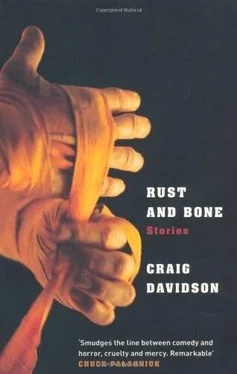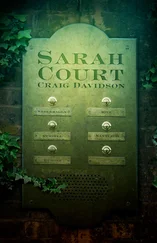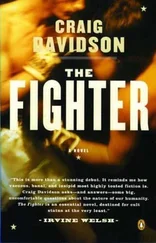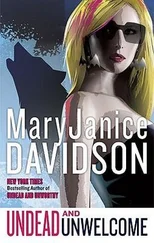We meet in the center of the ring, where the cigarillo-smoking promoter runs down the stakes: a thousand cash to the winner, five hundred to the loser.
Nicodemus dry-gulches me while the guy’s still laying out the stakes, a hard sucker punch glancing off the high ridge of cheek, splitting bone. The blow drops me to my knees. Chill static wind pours through my skull, electric snakes skating the bones of my arms and legs. Nicodemus shrugs and smiles, as though to say, Hey, you knew the score when you stepped up, then wades in swinging. Guess the fight’s started without me. It’s not uncommon.
I graduated in ’87 and moved north to Pennsylvania. Having trained and fought steadily through college, I’d amassed a Golden Gloves record of 13-1. Teddy Hutch, an Olympic boxing coach, caught one of my fights and invited me to his training facility in Butler. The welterweight division was thin, he said; I could earn a berth on the qualifying squad. The program covered food and accommodation. His prospects worked at a local box factory.
I arrived in Butler late September. The trees and water, even the sky: everything was different. The Texas sky was not completely blue; its colour, I’ve come to realize, was more of a diffuse lavender. The skies of Pennsylvania were a piercing, monotone blue; they pressed down with a palpable weight. The tattery, see-through clouds I’d known since childhood were replaced with thick cumulus formations. And the cold —me and a Hawaiian boxer named David Tua bundled ourselves in sweaters and jackets on the mildest of fall days, much to the amusement of the Minnesotans and Dakotans in training.
The prospects were billeted in a ranch house. The land behind fell away to a lake ringed by hemlocks and firs, rising to a wooded escarpment. We roused at five o’clock each morning and ate breakfast at long tables before donning road gear to run a three-mile circuit around the lake. Afterwards we herded into a school bus bound for Olympia Paper, where we spent the next nine hours ranged along canvas belt lines, driven half-mad by the pneumatic hiss of the fold-and-stamp machines. When the shift whistle blew we were driven to the Cyclone, a downtown boxing gym. We trained until eight o’clock before dragging ourselves to the bus, bolting dinner, and flopping into bed for lights out.
It was a rough life, and a lot of fighters couldn’t stomach it: prospects came and went with such frequency Teddy considered installing a turnstile. But the regimen yielded results: I packed on ten pounds of muscle in eight months, and my cardiovascular endurance shot through the roof. My sparring partner was a Dixieland welterweight named Jimmy Carmichael. Jimmy had a peacemaker of a left cross; we beat each other black and blue in the ring but spent our days off together, catching the Sunday matinee and wolfing thick wedges of pecan pie at Marcy’s on Lagan Street.
Jake visited that March. Steve was hauling a load up to Rochester and brought Jake along to visit. Steve dropped him off mid-morning, and we arranged to meet later for dinner. I was surprised how much Jake had grown. His cheeks, framed by the furred hood of a new winter jacket, were flush and rosy.
“How ya been, jellybean?” I said.
“I been fine, pal o’ mine,” he said, repeating the greeting I’d taught him.
Jake was antsy following the long drive. We walked down to the lake. A low fog rolled across the frozen water, faint ripples thickening into groundmist at the tree line. We held hands. Every fir looked dusted in powdered sugar. Jake’s hand slipped from mine as he ran ahead. He said, “I’ve never seen so much white .”
The lake was a flat opaque sheet. A murder of crows congregated on a tree shattered under a weight of snow. The northern boys skated here on weekends; I saw the ruts their blades had left in the ice. Jake ran out, falling, sliding, getting up, running faster.
“Hey,” I called. “Hey, slow ’er down, big guy.”
I was raised in a part of Texas where the only ice was of the cubed variety. I’d only seen snow in Christmas movies. I mean, what did I know of ice? I knew it felt good pressed to the back of my neck between rounds. My five-year-old nephew ran heedlessly, hood tugged down around his shoulders, fine sandy hair and clean tanned skin brightened by the sun. What did he know of ice? Perhaps that it melted quickly on a summer sidewalk. Did he even know that much? We were both ignorant. But I should’ve known.
Nicodemus rushes across the ring, jackhammering his fists. He throws a series of haymakers so slow he might as well have telegraphed them last week; I feint from a kneeling position and hammer a left hook into his ass, nailing the sciatic nerve. Shrieking, he limps back. I struggle to my feet and bicycle into the open ring. From time to time someone shouts Nicodemus’s name, and under that the distant hum of machinery.
He throws a looping right that I duck, rising with a short-armed cross to the midriff. He bulls me into a corner. I juke, try to circle clear, but he steps on my foot and hits me with an overhand right. Lips flatten against teeth, mouth filling with the taste of rust and bone. The air shimmers, shards of filigreed light raining down like shiny foil in a tickertape parade. I go down heavily under a sawhorse, staring up at a dark forest of legs.
I can no longer consciously recall the sound that ice made as it broke. Sometimes I’ll hear another noise—the low crumple of a beer can; the squeal of an old nail pried from a sodden plank—similar in some way, timbre or pitch or resonance, and realize it lives somewhere inside me now. I remember the fault line racing out to meet him, a silver crease transecting the ice like a cracked whip. It seemed to advance slowly, a thin sluggish snake zigging and zagging; it was as though I had only to holler “Step back!” and it would rip harmlessly past.
Water shot up in thin pressurized needles from hairline cracks under Jake’s feet. He lurched sideways, outflung arms seeking balance. The ice pan broke in half, plates levering up, a V of frozen water with Jake plunging through the middle.
I laughed. Maybe Jake looked silly going down, mouth and eyes wide, hands clutching at the broken border of ice that crumbled like spun sugar in his grasp. Maybe I could not conceive the danger: I pictured the two of us sitting before the fireplace in the big safe house, a blanket wrapped around his shoulders, a mug of hot chocolate, tendrils of steam rising off Jake’s wet pants as they dried.
“Hold on, big fella,” I said. “Do the eggbeater!”
My boots skidded along the ice. I overbalanced, fell down. Jake churned foam, clothes plumping with water. Everything seemed all right until I saw the fear and confusion, deep thin creases out of place on a face so young; I saw, with the dreamlike clarity that colors all memories of the event, molecular beads of water clinging to his cheeks and nose. I crawled forward, outspread hands distributing my weight. Jake splashed and kicked and called out in a reedy whisper, nose and mouth barely above water. Ice crackling under my hands and chunks of ice floating on the water and the trees of the near shore wrapped in transparent icy layers. So much ice .
He stopped struggling abruptly, just hanging there, eyes closed, water trickling into his mouth. Only his chin and the tips of his fingers floated clear. I reached the edge and extended a hand. The supporting ridge broke away and my chest and head slipped below the surface. Cold black water pressed against my eyeballs. I caught movement through the brown water and grabbed something—smooth and slim, perhaps a jacket sleeve—but the cold made my fingers clumsy and it slipped through. The lake shoved me back and forth, currents stronger than I’d imagined. Sinewy shapes turned over in the murk, shapes like seal pups at play.
Читать дальше












